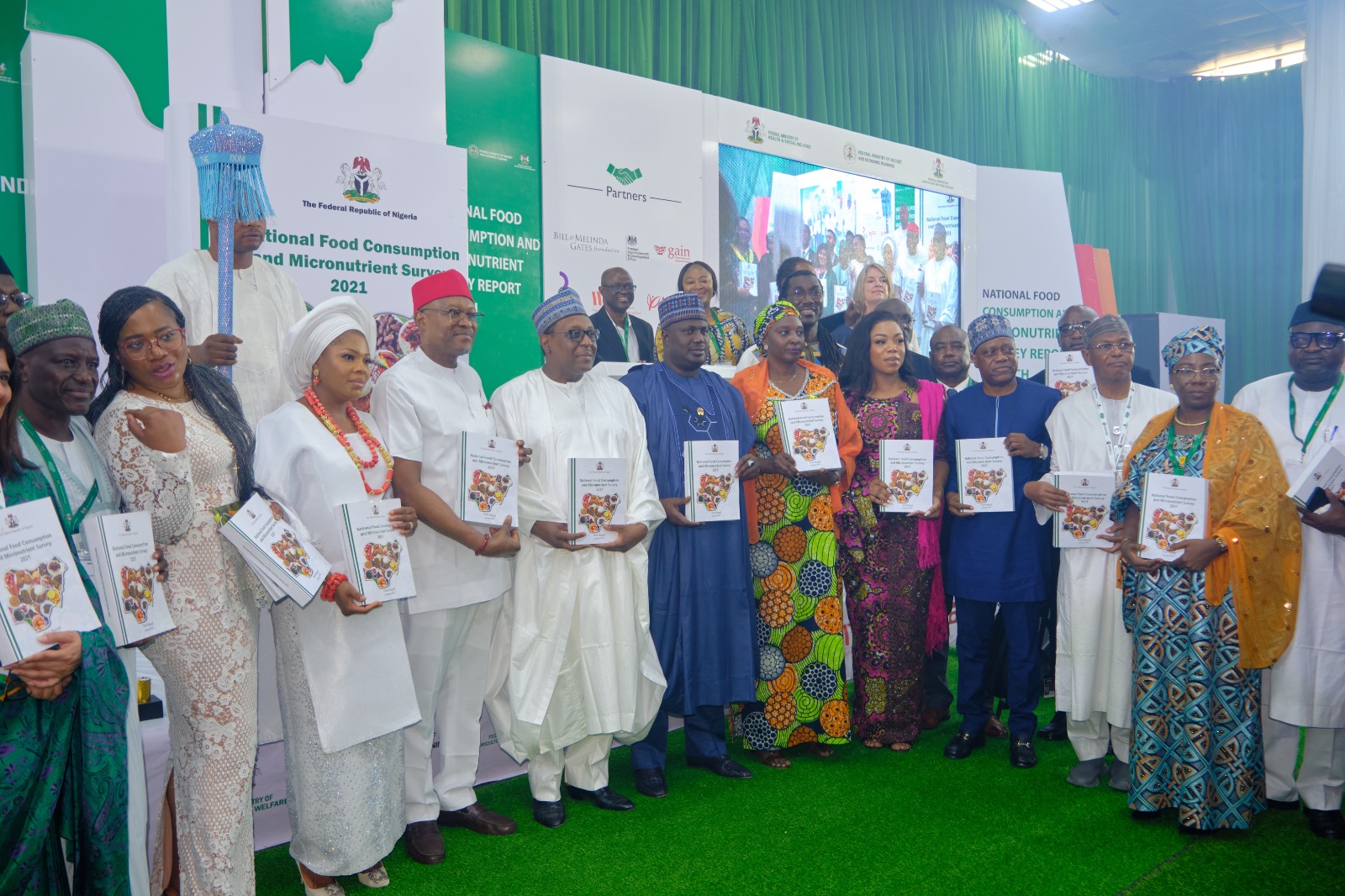Nutrition Survey report says 33.3% of under 5 children are stunted in growth
***As FG Launches NFCMS report with global approval
The Federal Government of Nigeria has successfully launched the 2021 National Food Consumption and Micronutrient Survey (NFCMS) report which among other things has indicated that 33.3% of under 5 children are stunted in growth.
The report has also been adjudged to be one of its kind globally.
The last National Food Consumption and Micronutrient Survey (NFCMS) was undertaken about 20 years ago in 2001, the findings of that study likely no longer represent the current micronutrient status or dietary consumption patterns of the Nigerian population.
This lack of recent and reliable information presented several challenges, both in terms of reviewing ongoing programmes and in informing the development of new guidance and policies.
Updated information on the population’s micronutrient status and dietary intakes is required for informed, evidenced-based decisions about current and future food, nutrition, and agriculture programming and policy making in Nigeria.
Hence the 2021 survey which has been globally acclaimed has become a reference point.
Director and Head of Nutrition Department of Federal Ministry of Health and Social Welfare, Mrs. Ladidi K. Bako-Aiyegbus presented the report at the technical session and thr launch held in Abuja

She said before the date for the launch was fixed they had started receiving calls from neighboring African countries to share the experience with them which led to the interface with colleagues in Indonosia.
She said, one thing that came out clearly was that the three ministries of Budget and Plannning, Agriculture and food security and the Ministry of Health had to be on the driver’s seat for the survey while the International Institute for Tropical Agriculture (IITA) provided the skills and capacity.
Some of their findings according to her were subjected to further verification in foreign lands results of which came out the same.
“For the first time in history, Nigeria conducted this survey with computer assisted personal interviewing which makes the data more acceptable
“The 2021 survey is unique in several respects as it was conducted using computer assisted Personal interviewing (CAP), survey instruments, and design can serve as a model for food consumption surveys in other African Countries.
“Nigeria is the first country to use the innovative tool INDDEX24 mobile application to collect data to assess dietary intake in a large scale survey
“Some of the dietary data include use of fortified foods to assess the impact of large scale fortification programmes and the consumption of biofortified crops used to measure the impact of these programs
“The report of the 2021 NFCMS provides information for evidence based policy and programmatic decisions for national supplementation, fortification, sensitization of appropriate nutrients consumption and other key nutrition interventions to achieve food and nutrition security in Nigeria.
“It provides subnational insights on micronutrient issues which enables more nuanced programming which addresses the unique characteristics of different sub groups of the population.
The Permanent Secretary of Ministry of Budget and Economic Planning, Mr. Nebeolisa Anako revealed that 33.3 percent of under five children are stunted in growth going by National Food Consumption and Micronutrient Survey, 2021.
Anako spoke while delivering his opening remarks on Monday at the technical session and launch of the 2021 national food consumption and micronutrient survey report held in Abuja.
He said the prevalence of stunting, wasting and underweight among children under 5 are 33.3%, 11.6% and 25.3% respectively.
His words, “According to the National Food Consumption and Micronutrient Survey, 2021, the prevalence of stunting, wasting and underweight among children under 5 are 33.3%, 11.6% and 25.3% respectively.
“However, malnutrition is influenced by a host of underlying factors related to poverty, including poor diet, food insecurity, poor water, sanitation and health services, which find their roots in factors that can vary from conflict to climate change; from scarce natural resources to high and volatile food prices; from poor governance to demographic growth. This is a huge burden and calls for very deliberate efforts to address” he said.
Continuing, Anako said Nutrition data plays a crucial role in program planning across various sectors, including health, education, agriculture, water, information and social welfare among others.
“Let us remain mindful of the profound impact that nutrition has on every aspect of human life, from physical health to cognitive development, from economic productivity to societal well-being” he noted.
He said the choices we make regarding what we eat directly impact our physical and mental vitality, shaping not only our individual lives but also the collective health of our society.
Also speaking, Director and Head of Social Development, Federal Ministry of Budget and Economic Planning, Dr. Sanjo Faniran said the findings of the survey will serve as a vital tool for policymakers, researchers, and stakeholders in the field of food and nutrition and provide valuable insights into the current state of our nation’s food consumption, enabling us to design targeted interventions and evidence-based strategies for improving nutritional outcomes.

